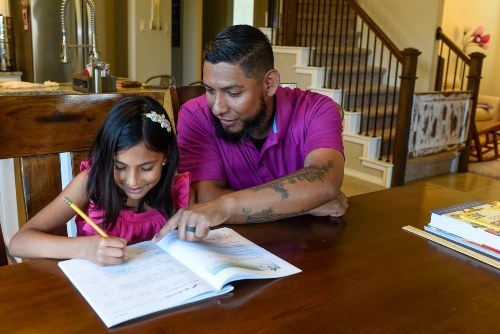Pandemic Adds to Challenges for Military Kids

Children of military parents face different challenges than those of civilian kids during normal times, but trends from the past year reflect additional stresses that arose from COVID-19 restrictions.
Military Kids are Stressed
“Longitudinal studies that RAND Corporation has done point to the fact that military kids are more stressed than their peers,” Kara Dallman, executive director of Our Military Kids (OMK), said. “Through our own studies and survey results we know that two out of three children are experiencing psychological stress.” Dallman explained that this psychological stress manifests itself in acting out, crying and depression, and attention deficit issues. “Our extracurricular activities give them a chance to choose something to help make them strong.”
Wounded Warrior Project ® (WWP) hosted a roundtable with partners National Military Family Association (NMFA), Our Military Kids (OMK) and the Military Child Education Coalition (MCEC) to identify ways to support the children of military parents. While no one organization can meet every need of military families, these partners work together with WWP to identify trends and provide resources, services and programs nationwide.
Learn more about WWP Community Partners.
The funding that WWP provides to OMK, for example, allows the children to participate in extracurricular activities at no cost to the family. And it’s not only the military kids who benefit; 89% of families and 96% of service members said their morale improved as well. The grants allow families to build a community and connection, and over 50% of the time children can find a mentor through these activities.
Dallman emphasized that 40% of children from National Guard families enlist in the military, so OMK not only cares for military children, but the future of the active force as well.
Restrictions Compounded Social Isolation, But There Were Upsides
Besa Pinchotti, acting executive director of NMFA, explained that the COVID-19 restrictions made isolation, something that is already difficult for military children, even more difficult.
“Last year, we had to pivot and take everything online,” said Pinchotti. “While that was difficult for so many, we learned a lot of important lessons when kids are dealing with all of the aforementioned things — isolation and loneliness. These kids haven’t been able to play with their next-door neighbor or play any sports. When things are stressful on a family that stress trickles down.”
This year, NMFA’s Operation Purple® is back to in-person camps but continuing virtual offerings. Pinchotti explained that one benefit of the pandemic is serving children and families that weren’t previously able to participate in Operation Purple®. “Not everyone is able to access it in person. Maybe families have special needs, or diabetes and could never attend, but now they can. We’re excited to continue the inclusivity.”
Virtual Learning Added to Isolation and Academic Challenges
Becky Porter, Ph.D., president and CEO of MCEC, said the stress on military children has taken a toll on their well-being and, consequently, their academic achievement. MCEC conducted an education survey that included military-connected students 13 and older, parents of students, and educators who are working with military-connected kids. The findings showed that this stress largely stems from social isolation.
Porter told the story of a military parent who came home to find her child working in front of the computer, frustrated. “He explained that he felt done with online schooling,” Porter said. “When assigned a group project over Zoom, the rest of his classmates had known each other beforehand and had everyone’s contact information, so they closed out of the meeting without including the military child. This left the child to work on the group project alone, as he had no way to contact his classmates. A situation like this is heartbreaking, not only for the parent, but can be scarring on the child as well.”
“From an adult’s perspective you can think of solutions but think about what it’s like for a child — especially an adolescent — who’s new and trying to interact with children and a teacher in a virtual setting when they haven’t met them in person. We have to keep in mind what some of the additional challenges are for our military kids,” Porter said. “From an education standpoint — if kids are not in a good space emotionally and mentally, they can’t take advantage of educational opportunities out there.”
Helping Through Community
The best thing to do for military-connected families and children is build communities of care and a support network. Bringing together educators, school counselors and parents, as well as both active-duty and National Guard kids, is key for an understanding what it’s like to be a military kid.
Organizations like OMK, MCEC, NMFA and WWP can help facilitate moves from one community to another, ease the transitions between schools, expand reach through virtual offerings, and identify opportunities to include military children even better as COVID-19 restrictions ease. WWP values supporting the military child, as this ultimately supports our warriors as well. Military kids serve, too, and helping them navigate challenges makes both the military-connected and civilian communities stronger.
Contact: Erin Cinney — Public Relations, ecinney@woundedwarriorproject.org, 904.832.5326
About Wounded Warrior Project
Since 2003, Wounded Warrior Project® (WWP) has been meeting the growing needs of warriors, their families and caregivers — helping them achieve their highest ambition. Learn more.